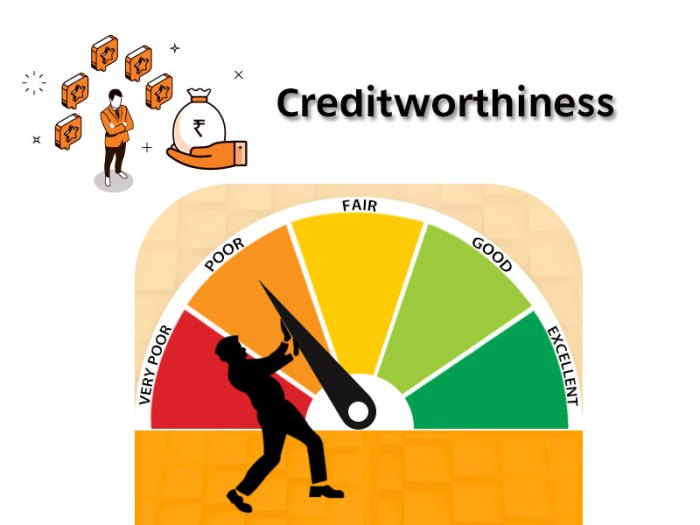Yo, we’re diving into the world of improving creditworthiness. Get ready to level up your financial game and secure that bag with these key insights and strategies.
Understanding creditworthiness is like having the cheat codes to financial success. Let’s break it down and empower you to take control of your credit destiny.
Understanding Creditworthiness

Creditworthiness is basically a fancy term that tells potential lenders how likely you are to pay back money you borrow. It’s like your financial reputation score – the higher it is, the better your chances of getting approved for loans, credit cards, or even lower interest rates.
Factors Contributing to Creditworthiness
- Your Payment History: Paying your bills on time shows lenders you’re responsible.
- Amount of Debt: Having too much debt can signal potential financial trouble.
- Length of Credit History: The longer you’ve had credit accounts open, the better.
- Credit Mix: Having a diverse mix of credit types (like credit cards, loans, etc.) can boost your creditworthiness.
- New Credit Applications: Opening too many new accounts at once can make lenders wary.
Impact of Creditworthiness on Financial Decisions
- Interest Rates: A higher credit score can mean lower interest rates on loans, saving you money in the long run.
- Loan Approval: Lenders are more likely to approve your loan application if you have good creditworthiness.
- Credit Limits: Higher credit scores can lead to higher credit limits on credit cards, giving you more financial flexibility.
Importance of Improving Creditworthiness
Improving creditworthiness is crucial for individuals looking to secure loans, mortgages, or credit cards. A higher creditworthiness score can open up more financial opportunities and better terms for borrowing money. It can also lead to lower interest rates and higher credit limits, saving individuals money in the long run.
Benefits of Higher Creditworthiness Score
- Access to Better Loan Terms: With a higher creditworthiness score, individuals are more likely to qualify for loans with lower interest rates and fees.
- Higher Credit Limits: Lenders are more willing to extend higher credit limits to individuals with good credit scores, allowing for more flexibility in managing finances.
- Improved Approval Odds: A higher creditworthiness score increases the chances of loan and credit card applications getting approved, providing financial stability and peace of mind.
Real-life Scenarios of Positive Outcomes
- Buying a Home: Someone with an improved creditworthiness score may qualify for a mortgage with a lower interest rate, resulting in significant savings over the life of the loan.
- Getting a Car Loan: A higher credit score can lead to better terms on a car loan, such as a lower down payment or reduced monthly payments.
- Credit Card Rewards: Individuals with good credit can access credit cards with attractive rewards programs, earning cash back, points, or travel benefits on their purchases.
Strategies for Improving Creditworthiness
Improving creditworthiness is crucial for financial stability and access to better opportunities. By taking proactive steps, individuals can enhance their creditworthiness and improve their overall financial health.
Importance of Paying Bills on Time
One of the most critical factors in determining creditworthiness is the timeliness of bill payments. Consistently paying bills on time demonstrates financial responsibility and reliability to lenders. Late payments can significantly impact credit scores and hinder the ability to access credit at favorable terms.
Reducing Debt to Impact Credit Scores
Reducing debt is another effective strategy for improving creditworthiness. High levels of debt relative to available credit can negatively affect credit scores. By paying down debt and maintaining low credit utilization ratios, individuals can positively impact their credit scores and demonstrate responsible financial management.
Monitoring and Maintaining Creditworthiness
Regularly monitoring credit reports is crucial for maintaining good creditworthiness. By checking your credit report regularly, you can identify any errors or fraudulent activity that may impact your credit score. It also allows you to track your progress in improving your credit score over time.
Importance of Regularly Monitoring Credit Reports
Regularly monitoring your credit report helps you stay on top of your financial health and ensures that the information being reported is accurate. It allows you to detect any suspicious activity early on and take necessary actions to protect your credit score.
Tips for Maintaining a Good Credit Score
- Pay your bills on time: Timely payments of your credit card bills, loans, and other financial obligations are essential for maintaining a good credit score.
- Keep your credit utilization low: Aim to keep your credit card balances below 30% of your credit limit to demonstrate responsible credit usage.
- Avoid opening multiple new accounts: Opening several new credit accounts within a short period can negatively impact your credit score.
- Regularly review your credit report: Check your credit report at least once a year to ensure all information is accurate and up to date.
Best Practices for Avoiding Actions that Negatively Affect Creditworthiness
- Avoid missing payments: Late or missed payments can significantly harm your credit score.
- Avoid maxing out credit cards: High credit card balances relative to your credit limit can lower your credit score.
- Avoid closing old accounts: Closing old accounts can shorten your credit history and impact your credit score negatively.
- Be cautious with credit inquiries: Too many hard inquiries on your credit report within a short period can lower your score.
